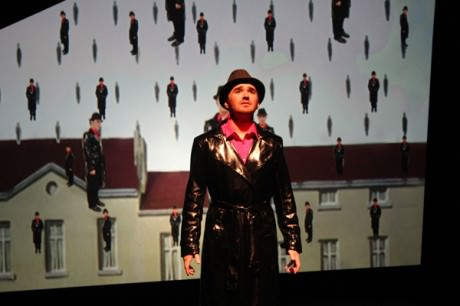Let’s say you are sitting in a sparse, quaint café minding your own business. All of a sudden, a patron’s cell phone goes off, breaking whatever mood was there to begin with, and this phone continues to ring. Do you break the anonymity between you and said patron, approach his table, and ask him to pick up his phone? Or do you curl up into yourself, metaphorically speaking of course, curse him in your mind, and continue on your way? In The George Washington University’s Department of Theatre and Dance’s production of Dead Man’s Cell Phone by Sarah Ruhl, Jean (played by Lauren Winters) breaks the anonymity and becomes ensconced in the people and affairs in Gordon’s (played by Sam Game) life. And yes, Gordon is the man at the other table who doesn’t pick up his phone… for a reason I don’t want to disclose to you, for fear of ruining this eye-opening, heartbreaking, and hilarious evening of theatre.

The cast takes you, the audience, on a journey through this man’s world, and their own processes of grief, that are part realism and part magical realism. Watching this cast of student actors take on such a treacherous script is a marvel to behold. With only his cellular phone to guide her, Jean sets off on a journey akin to assembling a large puzzle. Lauren Winters’s portrayal of Jean is all at once honest, quirky, and human. She lays the character’s faults out there on the stage, and organically makes sense of it before our eyes. Winters’s journey from a girl wrapping Gordon’s affairs in a tidy box with a nice bow on top of it, to a woman realizing that life is messy and doesn’t always fit in a neat little box is superb. She has moments of clarity the likes of which Jimmy Stewart performed in the film It’s a Wonderful Life. The gleam in the eye and the gratitude for the gift of interpersonal connection, and life, are all there in Winters’s performance.
Lily Sondik plays Hermia, Gordon’s wife, with a stunning blend of aplomb and insecurity. A sexually aware character, she serves as a nice contrast to Winters’s Jean in a scene the two share at a bar, in which Hermia lays her soul bare for Jean to attempt to comfort. Hilary Kelly’s Mrs. Gottlieb, Gordon’s mother, has a bite to her, isn’t afraid to say what’s on her mind at the expense of others, but she is grieving just as much as the rest of the characters in this play. Kelly commands attention in every scene she is in, and rightfully so. Her comedic timing is so adept that you hang on her every word to relish in her delivery.
Sam Game’s Gordon lives up to all of the mention of him in the first act, in which Gordon doesn’t speak at all. His delivery of the monologue that begins Act Two lives on the corner of smug and spot on. He so perfectly embodies that arrogant friend you can’t help but accept for who he is, because sometimes he says the things that most of us are too afraid to admit. Game’s presence is dominant, almost predatory, and the audience and Jean are his prey.
Andrew Flurer’s Dwight, Gordon’s younger brother, is inimitable and wears his heart, as well as his many quirks, on his sleeves. Flurer mesmerizingly captures the audience’s heart with his blend of self-deprecation and honesty. His chemistry with Winters is truly something to behold, as the two of them embrace his love of braiding hair and their mutual love of embossed invitations.
Meghan Bernstein’s portrayals of The Other Woman and Stranger are both interesting foils to Winters’s Jean. Bernstein shines in physical moments, such as The Other Woman’s sensual application of lipstick and the Stranger’s nimble stage combat acrobatics.
This production hangs on Director Elizabeth Kitsos-Kang’s wonderful vision for the production. Her takeaways from the play, eloquently written in her Director’s Note, shine through every aspect of the production. Kitsos-Kang writes, “Like Jean, all the characters in Dead Man’s Cell Phone long for human connection. But we find that real connection cannot be found in a text or voicemail… True human connection, love, requires human contact.”
All of the technical elements in the show embody this longing for contact, from the sparse set, designed by Shirong Gu, to the crisp lighting, highlighting various characters separately, designed by Carl Gudenius. Sigrí∂ur Jóhannes∂óttir’s costumes fit the quirks of the various characters and made their unique qualities shine through, even when they were dressed in black mourning garments. Karin Abromaitis’ fight choreography was thrilling and fantastical enough to believably live in this world that is both magically real and surreal. Tish Carter’s choreography of the Cell Phone Ballet was the perfect punctuation to the scene, and presented the audience with unique methods of moving from one place to another, suggesting the various methods we use to communicate through technology, and unison characterization, almost alien, to represent the lack of personality and individuality in emails, text messages, and the like.
If you are looking for an honest break from technology and the daily grind of your life, and want to go on a magically real journey through the lives of six unique characters, check out The George Washington University’s production of Sarah Ruhl’s Dead Man’s Cell Phone.
Do yourself, and your fellow audience members, a favor and turn off your mobile device(s) at the top of the show because there is nothing ironic about your phone buzzing, beeping, etc. in a play about living in the moment, and how these devices hinder one’s attempts to do so.
Running Time: Two hour, with a fifteen-minute intermission.
Dead Man’s Cell Phone plays through Sunday, October 20, 2013 at the Dorothy Betts Marvin Theatre at The George Washington University – 800 21st Street NW, in Washington, DC. For tickets, purchase them online, or at the door.





